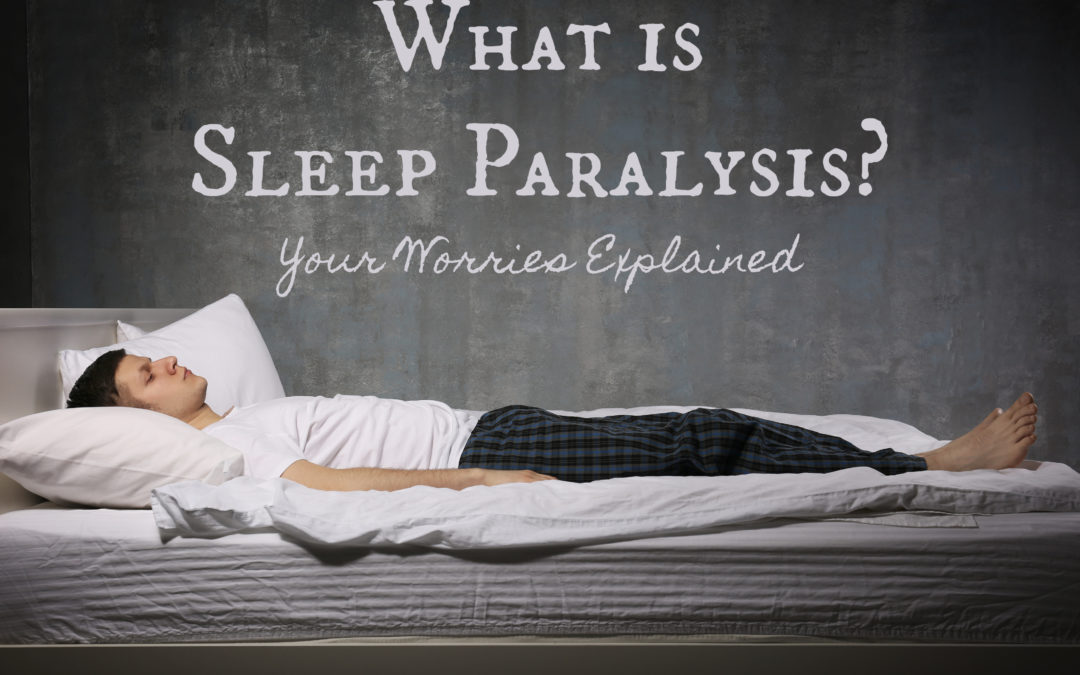By: Lauri Leadley, CCSH, RPSGT – Clinical Sleep Educator|Sleep Coach

Lauri Leadley, CCSH, RPSGT
Sleep paralysis is a relatively common sleep-associated experience. It is characterized by a temporary inability to move or speak either while waking up or falling asleep.
During the dream state or when you’re experiencing REM sleep, the body’s muscles go into a state of relaxation. This prevents the body from reacting to or acting out dreams. If the body continues to be in this state of relaxation after REM, physical movement remains restricted even if the person is conscious. This is the defining symptom of sleep paralysis.
In some people, an episode of sleep paralysis can be accompanied by vivid dreams or hallucinations. This could be the reason some people attach a fear factor or supernatural element to their experience.
Is sleep paralysis dangerous?
The inability to control movement despite being conscious can be terrifying. A person experiencing sleep paralysis will find it difficult to move their arms, legs, head, and body.
Also, while breathing continues to be normal for some people, in others, it could be impaired. An episode of sleep paralysis can last for a few seconds, or it could last for a couple of minutes.
One out of four individuals will experience an episode of sleep paralysis at one point or another in their lives. While some people might experience sleep paralysis only once in their life, others might experience periodic or frequent episodes.
If you have been experiencing sleep paralysis repeatedly, I would recommend consulting with a sleep professional. Your episodes may be linked to other sleeping disorders such as obstructive sleep apnea (OSA) and narcolepsy.
What can trigger an episode of sleep paralysis?
In most cases, sleep paralysis occurs while falling asleep at night. However, sleep paralysis can also occur during the waking stage and during daytime naps.
Several factors can cause sleep paralysis like stress or sleep deprivation. A disrupted sleep schedule or someone suffering from shift work sleep disorder can also be at risk of experiencing sleep paralysis.
Other common triggers for sleep paralysis include:
- Mental disorders such as depression and anxiety.
- A family history of sleep paralysis (although the genetic cause is unknown).
- Use of certain drugs or consumption of alcohol.
- Sleeping disorders such as OSA and narcolepsy.
- Physical fatigue and excessive mental stress.
- Certain medications.
Note: In most cases, people report episodes of sleep paralysis when sleeping on their backs. However, this is not to say that sleep paralysis does not occur when a person sleeps on their sides or stomachs.
Can sleep paralysis be cured?
As I mentioned above, in most cases, sleep paralysis occurs on a single occasion and does not pose any major risks.
However, if sleep paralysis occurs on multiple occasions, it warrants a more detailed assessment by a professional sleep coach. It is best to identify and eliminate or address any other factors which might be causing your sleep paralysis.
How can I prevent sleep paralysis?
The best way of preventing sleep paralysis is to practice sound sleep hygiene. You can do the following:
- Stick to a routine sleeping pattern.
- Ensure your sleeping environment is peaceful, neither too hot nor too cold and free of disruptions like light and sounds.
- Avoid stimulants such as caffeine and high-energy beverages or high-calorie foods before bedtime.
- Try and de-stress before bedtime by practicing meditation, taking a warm shower, or doing a few relaxing yoga postures.
A Word of Advice from Valley Sleep Center
If sleep paralysis occurs on a frequent basis, or if you are worried that an underlying cause might be triggering these episodes, it is best to consult with a professional sleep coach.
If your sleep paralysis is being triggered by a sleep disorder like OSA or narcolepsy, treating the sleeping disorder is important to prevent not only the occurrence of sleep paralysis but more importantly to prevent any other associated physical and mental health risks.
Valley Sleep Center – We Can Help You Sleep Better!
Are you experiencing frequent episodes of sleep paralysis? Is a sleep disorder affecting your physical and mental health? Do you suffer from poor quality sleep? If yes, then we at Valley Sleep Center can help you. For a consultation with sleep coach Lauri Leadley, please email us at sleep@valleysleepcenter.com


